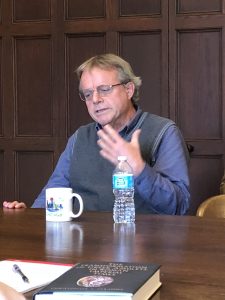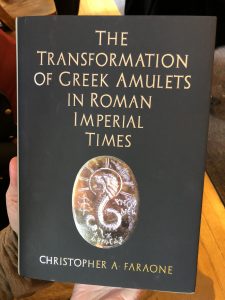November 2024

We are pleased to announce that our project Names and Orality in Magic in Antiquity (NOMINA) has been awarded a generous grant by the Hellenic Foundation for Research and Innovation (HFRI) [PI Panagiota Sarischouli, team Korshi Dosoo, Chris Faraone, Raquel Martín Hernández, Sofía Torallas Tovar]. The primary goal of the project is to compile and systematically study the complete corpus of Graeco-Egyptian voces magicae, with a focus on their transcultural nature and linguistic complexity. To facilitate research, the corpus will be lemmatized, categorized, and made available in an open-access database, allowing for the study and comparison of these magical terms within their cultural, geographical, and chronological contexts. A key objective of the project is to foster interdisciplinary dialogue among scholars working on various magico-religious traditions (Greek, Latin, Egyptian, Jewish, Christian, and Arabic). This dialogue will contribute to a deeper understanding of linguistic interactions, cultural exchanges, religious syncretism, and the transmission of magical knowledge in Late Antiquity.
November 2023
We are extremely pleased to announce that we have been awarded the C.J. Goodwin Award of Merit of the Society of Classical Studies in recognition of our book, The Greco-Egyptian Magical Formularies.
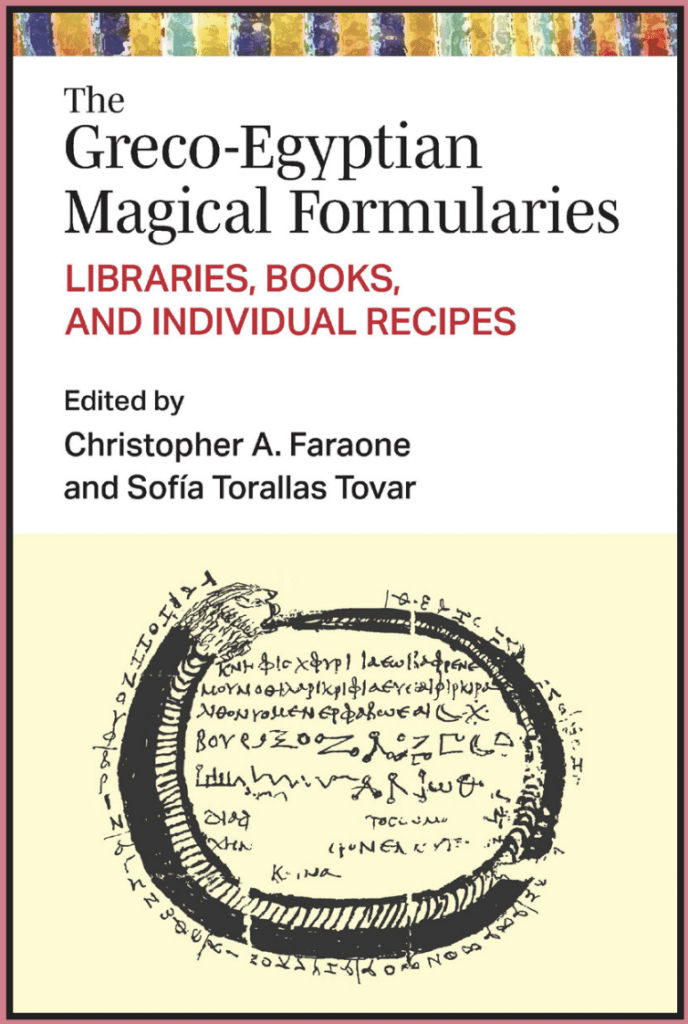
The news are here:
https://classicalstudies.org/
It is great news for us as scholars of Ancient Magic, but also it is great for the field of papyrology.
Information on the book: The Greco-Egyptian Magical Formularies | University of Michigan Press (umich.edu)
See also below for the table of contents.
June – July 2023 Conferences
It has been a very busy month for the magoi! It started with a conference in Malmö, Sweden, at the 9th Conference of the European Society for the Study of Western Esotericism (June 26-28), where Korshi Dosoo organized a panel on Ancient magic with members of our team and other colleagues. It was a true pleasure to see the interest in our work.
We then met in Athens (July 3-5), for a one day conference at the Norwegian Institute in Athens. The program for the conference can be seen here. After the conference, the Editorial Board of GEMF dedicated two full days to work on the editions for volume 2 (which will contain PGM III, IV and V).

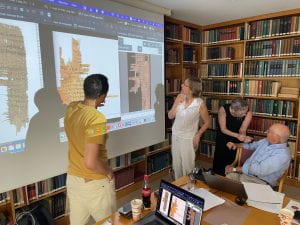
Finally, Korshi Dosoo, Sofía Torallas Tovar, Jordan Johansen and Sophia Alkhoury planned a day of research at the storage of the Louvre. They had an exciting appointment with Papyrus Mimaut. Not only did they confirm the joints for the new order of the fragments, but they discovered exciting things about the ink! Stay tuned!



June 2023
Presentation on the Voces Magicae Project in London
On June 9th, our colleague Panagiota Sarischouli was invited to the Institute of Classical Studies in London to present the project for a database of Magical Names: NOMINA. You can see her presentation in YouTube.
Workshop with James Cowey in Madrid
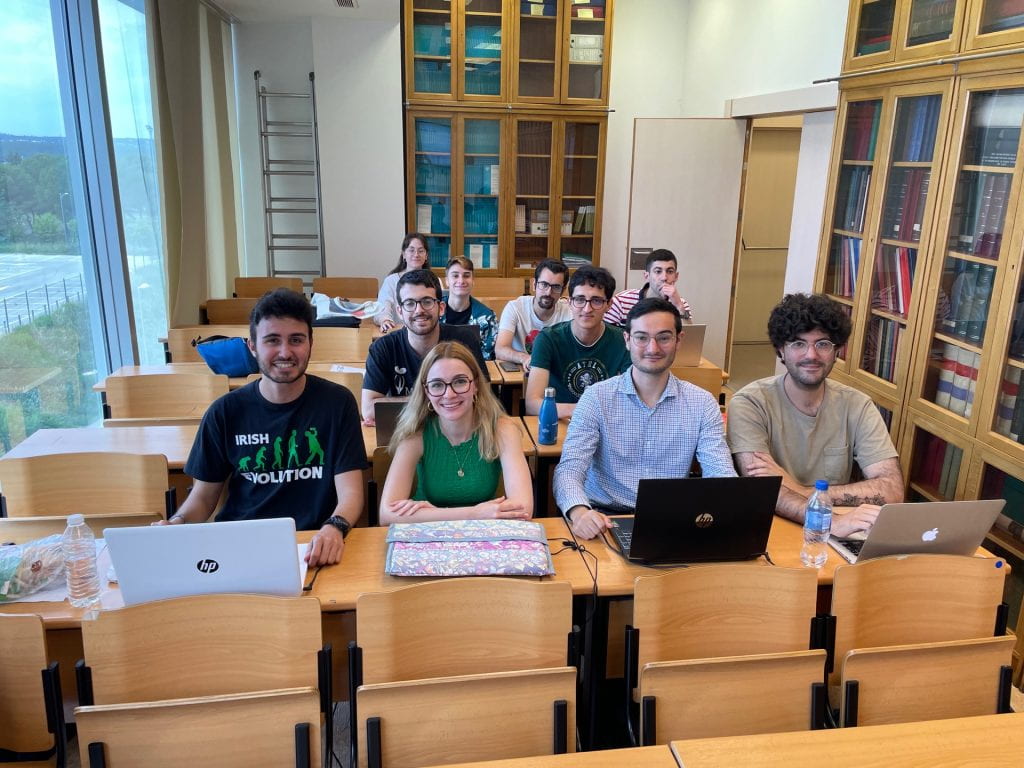
The week 19-23 June 2023 we have had the pleasure of receiving James Cowey, from the University of Heidelberg, who has given a workshop on the codification of Greek texts at the Complutense University. Ten students from the Uniersidad Complutense, and those in Zaragoza, Malaga and Extremadura worked hard to learn and contribute to the digitization of the Greek magical papyri.

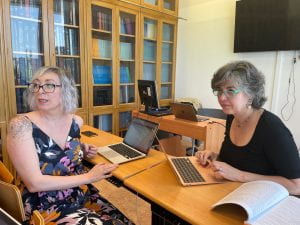
The result of this work is an important contribution to digital access to papyrological texts. Until now, magical texts had not been systematically incorporated to papyri.info, so this is an important extension of the corpus.
The papyri.info corpus started decades ago only with Greek documentary papyri texts (contracts, letters, etc.) and was gradually extended to texts of other types (e.g. literary and paraliterary), and other languages (such as Latin and Coptic).
We are planning an extended collaboration with the students who participated. More information to follow!
For an example of the type of work, click here.

February 2023
Structuring Magic: Towards a Digital Infrastructure of Texts and Artefacts
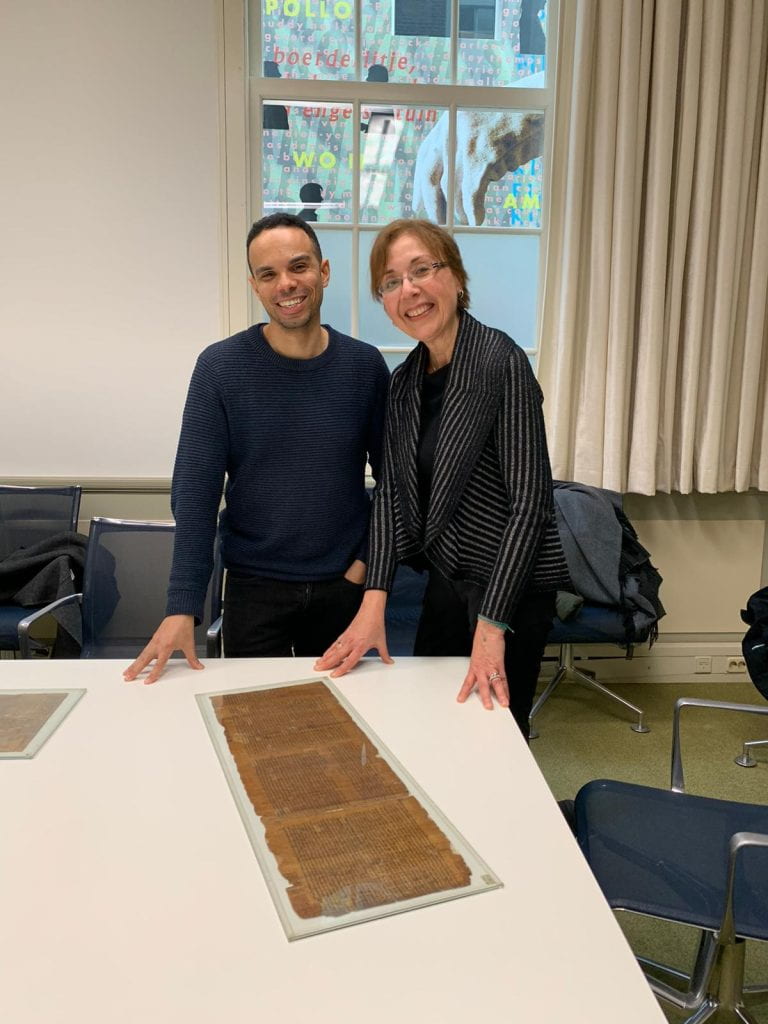
20-24 February @ Lorentz Center Snellius/Hybrid
Three of the participants of the Transmission of Magical Knowledge project – Korshi Dosoo, Raquel Martín Hernandez, and Panagiota Sarischouli – collaborated recently with Ortal-Paz Saar (Utrecht University) to organise a workshop, Structuring Magic, with the goal of laying the basis for an integrative study of magic from different cultures, periods, and locations. The key aims of the workshop were: (i) outline the needs of the field, (ii) plan concrete steps to solve these needs, e.g., through DH and computational linguistics methods, and (iii) establish an interdisciplinary network of scholars who would begin pursuing these steps. From February 20th to 24th, 2023, 15 scholars who have worked on various magical traditions (Mesopotamian, Demotic, Greek, Coptic, Hebrew, Aramaic, Arabic, Armenian, Ge’ez) came together (either in person or on zoom) to discuss what tools researchers need to carry out a comparative and historicising project on these magical corpora, and how a meaningful interdisciplinary collaboration might be established. Joining them were scholars of digital humanities, computational linguistics, and artificial intelligence, to help explore methods that could be employed to take these new steps. Two afternoons of the week were devoted to visiting magical manuscripts in Leiden – the Greek, Arabic, and Ge’ez manuscripts in the collection of the University Library, which includes the recently-re-edited GEMF 34 (=PGM LXII) and manuscripts of the Arabic “Goal of the Wise”, translated into Latin as the Picatrix – and Demotic, Greek, and Coptic papyri of the the National Museum of Antiquities, including the famous magical papyri P. Leiden I 383 (=GEMF 16/PDM xiv) [in the image above with Korshi and Panagiota], 384 (=GEMF 15/PGM XII), 385 (KYP M171, containing the Letter of Jesus to Abgar), and 395 (= GEMF 60/PGM XIII).
March 2023
Sofía Torallas Tovar will be giving a paper on Compilators of Magic at the University of Florence/Istituto Papirologico Vitelli.

October-November 2022
There is no stopping to our fantastic team of magoi. October 13-14 we held our conference on GEMF 57/PGM IV, which was a total success. Here is the program New approaches to the Great Paris Magical Codex.
We also are proud to announce the publication of the book of essays that resulted from our careful studies of each individual formulary, and was published by Michigan University Press.
See below the Table of Contents.

I. Libraries, Codices, and Rolls
Chapter 1. Anatomy of the Magical Archive by Korshi Dosoo and Sofía Torallas Tovar
Chapter 2. Roll vs. Codex: The Format of the Magical Handbook by Korshi Dosoo and Sofía Torallas Tovar
Chapter 3. The Paleography and Dating of the Magical Formularies from Roman Egypt by Alberto Nodar
II. Compositional and Redactional Patterns
Chapter 4. Compositional Patterns in the Great Magical Papyrus of Paris (GEMF 57 = PGM IV) by Lynn R. LiDonnici
Chapter 5. The Composition of the Demotic Magical Papyrus of London and Leiden (GEMF 16 = PGM/ PDM XIV) by Korshi Dosoo
Chapter 6. GEMF 60 (PGM XIII): A Study of Material, Scribal, and Compositional Issues by Richard Gordon and Rachel Yuen- Collingridge
III. Distribution of Texts and Their History
Chapter 7. GEMF 74 (PGM VII): Reconstructing the Textual Tradition by Richard Gordon and Raquel Martín Hernández
Chapter 8. GEMF 15 (= PGM/ PDM XII): Production and Use of a Bilingual Magical Formulary by Panagiota Sarischouli
IV. Individual Recipes 367
Chapter 9. The Composite Recipes in GEMF 57 (= PGM IV) and How They Grew by Christopher A. Faraone
Chapter 10. The Rationale of Multi- Purpose Praxeis in the Formulary Tradition by Richard Gordon
Chapter 11. The Traffic in Magical Spells: Single- Sheet Formularies as Prompts for Oral Performance by Christopher A. Faraone.
Our colleague Raquel Martín organized a conference a few years ago about magical drawings. The result is this wonderful book. URL. You can see the table of contents below.

The study of magical texts of the Classical, Greco-Roman and Late Antique World has experienced a remarkable impulse since the last decades of the twentieth century until today. The so-called “material turn” in philological studies has promoted an ever-growing interest in the study of the materiality and other non-textual components of ancient documents, which has favored interdisciplinary studies aimed at a holistic approach to ancient texts. From this perspective, the articles collected in this volume offer a series of in-depth case studies of images and other paratextual elements of magical artifacts. Comparative studies, statistical analyses, image-text interconnections, and other analytical possibilities are applied to achieve a greater understanding of the magical objects in question, as well as of the belief system in which they were produced. The book illustrates the importance of iconographic analysis as a fundamental part of understanding Antiquity, its ritual texts, and its magical objects.
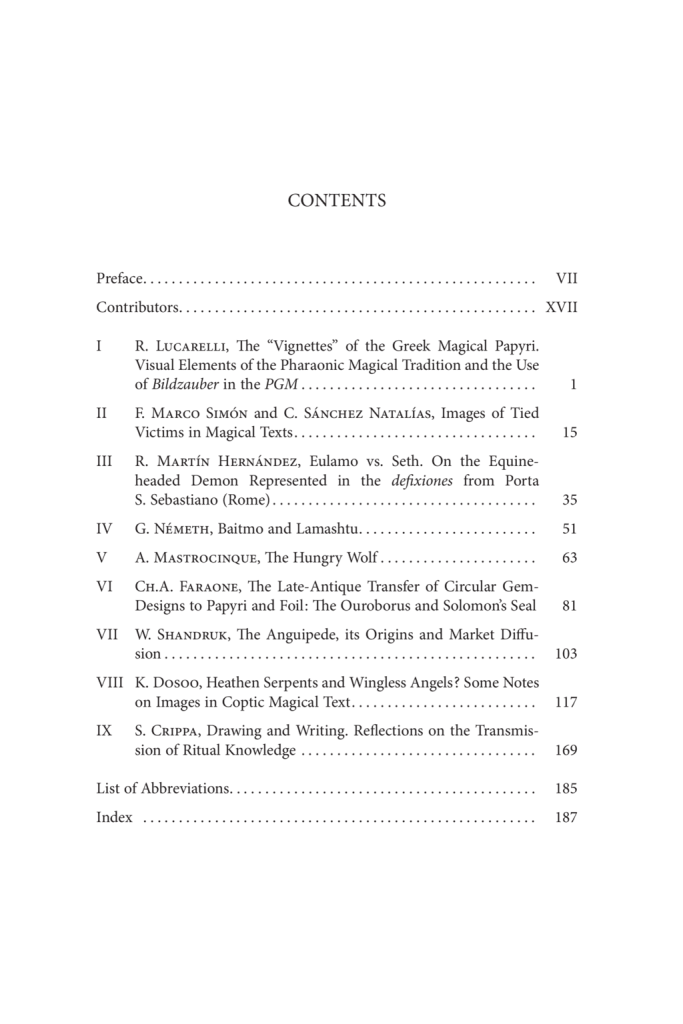
September 2022
On Sept. 13th the first volume of GEMF was presented at the Fundación Pastor de Estudios Clásicos in Madrid.
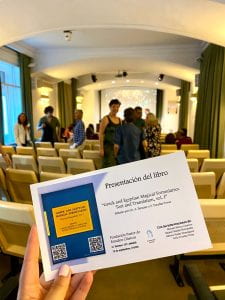

The book was presented by four members of the research group: Miriam Blanco, Raquel Martín, Alberto Nodar and Sofía Torallas. The main contributions of this new edition were presented in this session: the corpus, the chronology and paleographic dating, the importance of the paratextual features of the magical papyri and their relationship with Greek literature.




May 2022
Conference at the Wissenschaftskolleg Berlin (19-20 May 2022)
“Scribes and Readers of Magical Texts in Late Antique and Medieval Egypt”

We are extremely grateful for the support provided by the Otto and Martha Fischbeck Foundation and the Wissenschaftskolleg at Berlin in May earlier this year for our conference on Late antique and Medieval Magic. It was coordinated by Chris Faraone and Sofía Torallas Tovar, co-directors of the project “Transmission of Magical Knowledge.” Our main purpose was to connect our research group, the Neubauer project, to other groups and researchers in Germany who worked on parallel and similar topics, namely the Würzburg “Kyprianos: Coptic Magical Texts project”, run by Korshi Dosoo, two projects at the Freie Universität: one of them “Zodiac”, run by Andreas Winkler (joined by our colleague Michael Zellmann-Rohrer), and “Wortschatzes der ägyptischen Sprache”, run by Sebastian Richter (but also joined by his graduate student Krisztina Hevesi), and the Venice ERC “Early Jewish and Christian Magical Traditions”, whose IP Joseph Sanzo could only join us on zoom due to illness.
For the program, see here.
The already existing scholarly links between us were reinforced greatly thanks to this meeting. We are planning to publish a book of collected essays with some of the participations in this conference, which would be a continuation of our forthcoming book The Greco-Egyptian Magical Formularies. Libraries, Books and Recipes, University of Michigan Press (New Texts from Ancient Cultures) 2022 .
April 2022
The pandemic has been very productive! The first volume of our edition of the magical handbooks on papyrus has been edited in California Classical Studies.
It contains the first 54 formularies in their original languages (Greek, Demotic and Old Coptic), with English translations, introductions and plenty of commentaries as footnotes to the translation. We are working hard on volume 2, that should be out by the end of next year.
July 2020
We are very pleased to announce that the Neubauer Collegium for Culture and Society at the University of Chicago has granted us a second project to continue working on the edition of the Greco Roman Magical Formularies.
November 2019
We are very happy that Huaxi Zhou, senior in the College, majoring in Classics, minoring in linguistics and NELC has joined us with a Fellowship from the College Research Fellows Program at the University of Chicago, for the Academic Year 2019/20. We are looking forward to collaborate with her.
In the photograph, she appears with Raquel Martín, after a training session in which Raquel introduced Huaxi into the world of tracing and imaging magical drawings.
Huaxi will produce an edition for volume 2, and will collaborate in different editorial tasks.
June 2019
Curses in Context 3 and Editorial meeting! Athens, Norwegian Institute
We are looking forward to the two events that we are organizing in Athens, at the Norwegian Institute at Athens:
- Curses in Context conference 3:Greek Curse tablets of the Classical and Hellenistic Periods
- Our annual editorial meeting for the Transmission of Magical Knowledge Project. We are about to announce that the first volume is already a full draft. The second volume will be discussed in our meeting (June 10-14th).
We take the opportunity to thank Anastasia Maravela for all the hard work to make this happen, the Neubauer Institute, the Wigelands fund of the University of Chicago and the Norwegian Institute in Athens for their support.
April 2019
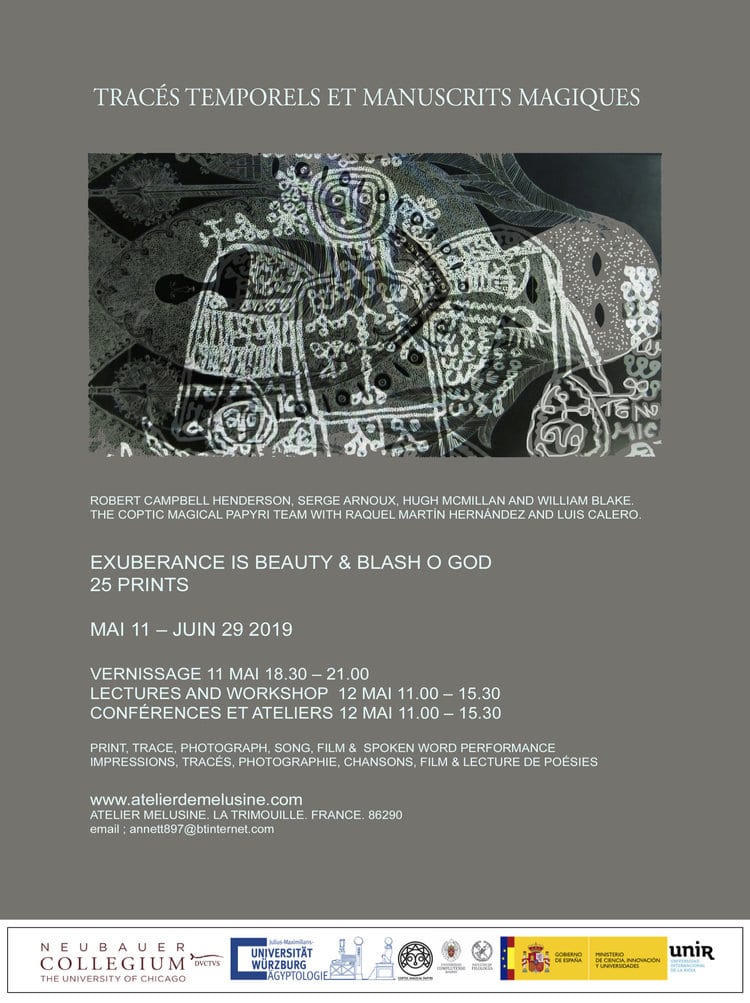 Exhibition Announcement: Tracés temporels et manuscrits magiques
Exhibition Announcement: Tracés temporels et manuscrits magiques
Our colleagues Raquel Martin (Madrid) and Korshi Dosoo (Würzburg) participate in this exciting exhibit that will combine images and music: 24 tracings of drawings from Coptic, Demotic and Greek magical papyri, will be accompanied by music created for the event by Dr. Luis Calero, an expert on ancient Greek music and performance, as well as a soloist singer, who has recorded reconstructions of the Hymn to Typhon from the Greek magical papyrus PGM IV, and the Oxyrhynchus Hymn, the oldest piece of Christian music whose notation survives.
The exhibition will open on 11 May 2019 and last until 29 June 2019. Korshi and Raquel will be giving a lecture on the study of ancient magical images, as well as a workshop of experimental archaeology, producing papyrus amulets, on the 12 May 2019.
For more information: click here
April 2018
New book by Christopher Faraone
Last Tuesday, April 10 we celebrated the publication of Chris Faraone’s new monograph, The Transformation of Greek Amulets in Roman Imperial Times, with a discussion by an interdisciplinary panel of UChicago faculty and students. The discussants were Joshua R. Vera (Ph.D. student in History), Kelly Holob (Ph.D. student in Divinity, and Bruce Lincoln (Professor Emeritus from Divinity).
Congratulations, Chris, on this great achievement!
New positions
We are very pleased to announce the new positions of some of our collaborators.
In September 2018 Korshi Dosoo will take up a post-doctoral position at the Julius-Maximilians-Universität, Würzburg, co-ordinating a 5-year project on Coptic magical texts. This project will involve the creation of a database of published and unpublished texts, the edition and re-edition of original manuscripts, and the production of research situating them within their historical, social and intellectual context. The project is currently recruiting two team members – a doctoral and post-doctoral researcher-; further details may be found here:
Myriam Blanco has been appointed Research Postdoctoral Fellow in the project HORIZON 2020-ERC “AlchemEast –G.A./24914” Alchemy in the Making: From ancient Babylonia via Graeco-Roman Egypt into the Byzantine, Syriac and Arabic traditions (1500 BCE – 1000 AD), at Università di Bologna. She is working on P.Leiden X and P.Holm. and their relationship to the other books in the Theban Library.
Eleni Chronopoulou has also been appointed as ‘assegnista di ricerca’ (postdoctoral researcher) in the project Papiri magici greci: revisione ecdotica e analisi lessicale at the Università di Firenze.
November 2016
The Form, Utility and Professional Technê of Practical Handbooks in the Ancient World
Saturday, November 12
8:30 am – 6:20 pm
Neubauer Collegium for Culture and Society
5701 S. Woodlawn Avenue
Chicago, Illinois 60637
As part of the activities of our project, we have organised a meeting around the topic of handbooks in antiquity. For the program, click here.
September 2016
Raquel Martín Hernández organised in Madrid the conference “Drawings, Charakteres and Figural Representations in Ancient Magic. New Perspectives” on September 15th and 16th 2016 at the Universidad Complutense de Madrid. For the program, click here
July 2016
Magical papyri have a special section at the 28th International Congress of Papyrology, where many of our collaborators will present their research. Schedule is here.
Our sister project To Zodion is focusing on the study of drawings and graphics in the magical papyri.
March 2016

We are planning our next editorial meeting in August (8-9) in the best setting for a discussion on magic, the Abbey of Montserrat. This will happen right after the Congress of Papyrology. We will soon report about the session on Magical papyri at the congress.
We are happy to report that the SBL series Writings of the Greco-Roman World has accepted to publish our edition in two volumes. For the series see: http://www.sbl-site.org/publications/books_wgrw.aspx. Our first plan is to distribute the material chronologically in two volumes, so the first volume will cover 1st cent. BCE to III-IV, and the second IV-VII.
Further matching funding obtained by members of our team in Spain:
Alberto Nodar and Raquel Martín have obtained project funding for three years for their collaboration on papyrological work, established between the Universities Pompeu Fabra in Barcelona and Complutense in Madrid. This collaboration and work on Spanish papyrological collections can be followed at http://dvctvs.upf.edu.
Also Emilio Suárez de la Torre has obtained funding for his project specifically on the Greek Magical Papyri, based at the U. Pompeu Fabra in Barcelona.
September 2015
The first editorial meeting of the project TRANSMISSION OF MAGICAL KNOWLEDGE IN ANTIQUITY: THE PAPYRUS MAGICAL HANDBOOKS IN CONTEXT will take place on September 25th, 2015, at the Chicago Center in Paris. The program can be viewed here.
Raquel Martín Hernández (UCM, Madrid) has recently obtained one of the 63 research grants of the Fundación BBVA, Spain, one of the few in the category of Humanities. Her proposal focuses on the magical drawings and their relationship to the magical prescriptions, and she is going to be responsible within our team for the digital reproduction and study of the images in Magical Handbooks.




